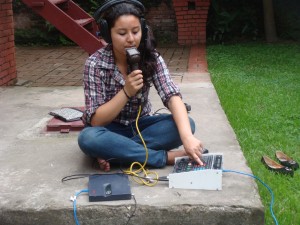“Shweta Rajbhandari is a sophomore intending to major in International Politics and Economics in Middlebury College. This past summer, through the generous funding of Deixler Swain, she interned with BBC News in Nepal, her home country.”
I worked closely with the BBC Correspondent for Nepal, Ms. Joanna Jolly, to produce online, radio and TV news broadcasts. I have always been interested in broadcast journalism, and by applying for this internship, I hoped to understand the demands of journalism as well as learn about the work that goes into producing a final news piece which is broadcast through various news media. I was also curious to learn about the day-to-day responsibilities of a journalist and explore this field as a potential career option.

Through my internship, I have been exposed not only to the pressures and demands of journalism but also to the incredible responsibility with this job. As a journalist, I learned that you are in a position to give voice to issues and problems in society that would have otherwise gone unnoticed or unheard of. This became even clearer to me when we were researching for a story this summer. The Nepalese government allocated a lump sum this year in its annual budget to award Rs. 50,000 ($649.35) as a cash incentive to men for marrying widows. While the nation was almost in a celebratory mode to find that the government had finally recognized the plight of widows with its recognition in the annual budget, we found that the widows were humiliated beyond measure and utterly embarrassed by the government’s absurd move. We interviewed some widows and they said that the incentive felt like a price which the government thought a widow was worth! Had it not been for journalists like Joanna who reported on the widows’ reaction and resentment, the government might have not ever corrected its insensitive attempt to uplift the status of widows in the Nepali society.
In the course of various natures of stories we covered this summer; it really helped me learn a lot more about the political, social and economic structure of Nepal than I previously did. The interaction I had with families of victims who were brutally murdered, lynched and kidnapped, as well as the pain that I could feel in their eyes and words is something I could never have felt or learned from attending lectures or by reading books. Also, I learned the skills of approaching people and difficult situations as a journalist. I also became more familiar with different radio and television equipments used to record interviews and broadcast them through satellite phones. In addition, I also came to acknowledge and respect the hard work, research, patience, and determination required in this job. The internship not only informed me about the demands of this field but also provided me with life-long lessons that will help prove invaluable both in my academic and personal life. I have had the most enriching experience working as an intern at BBC in Nepal this summer.